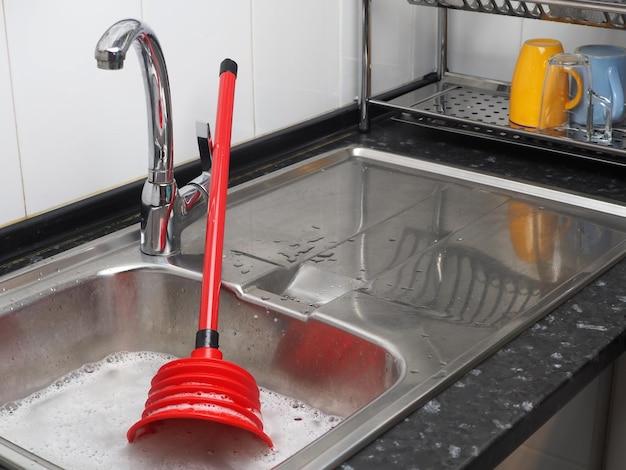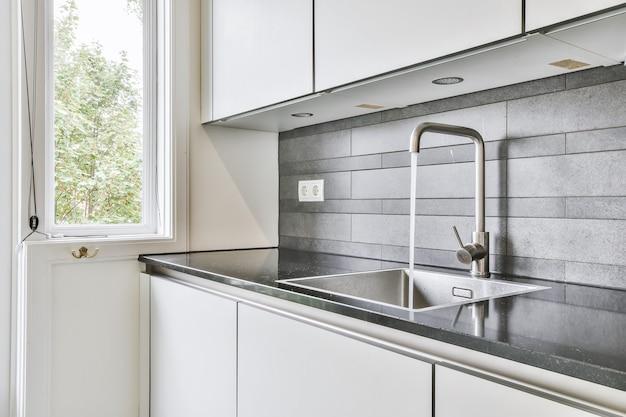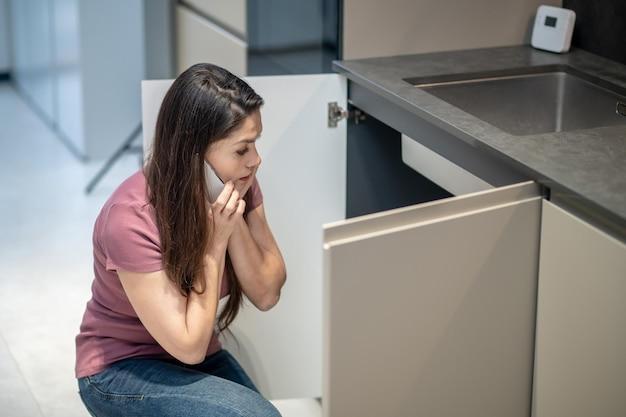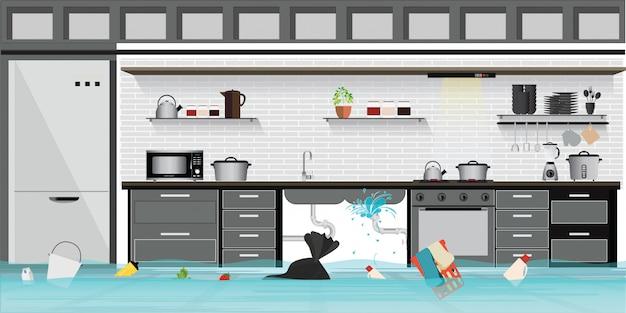It’s a nightmare scenario. You walk down to your basement, and there’s a pool of water that wasn’t there before. You look up, and there it is: your kitchen sink leaking through the pipes and into your basement. You start to panic, wondering how long it’s been going on and how bad the damage is. Don’t worry; you’re not alone.
This is a common problem that many homeowners face. Whether you’re dealing with a small and steady leak or a full-blown flood, it’s crucial to take action right away. The longer you put it off, the worse the damage can get, and the more it can cost in terms of repair bills.
In this comprehensive guide, we’ll cover everything you need to know about kitchen sink leaks and what to do if they happen. We’ll explore the causes, the warning signs, and the steps you need to take to fix the problem before it gets out of hand. We’ll also talk about how to find a trustworthy plumber near you and what questions to ask when hiring them.
So, if you’re dealing with a kitchen sink leaking into your basement, don’t despair. With the right information and a little bit of know-how, you can get things back to normal in no time. Let’s dive in and get started!
The Causes and Solutions for Kitchen Sink Leaking into Basement
Nobody likes to be greeted by a watery surprise when they head down to their basement. Unfortunately, this is what can happen when something goes awry with your kitchen sink. If you have the misfortune of experiencing a kitchen sink leaking into your basement, there are several causes and solutions to consider.
Common Causes of Kitchen Sink Leaks
The first step to solving a leaking kitchen sink is identifying the cause of the problem. Here are some common issues that can lead to a kitchen sink leaking into your basement:
Loose Connections
The most common reason for a kitchen sink leaking into the basement is loose or damaged connections. These connections keep the water flowing in the right direction and ensure there aren’t any leaks. If they are loose, water can seep out and cause damage.
Clogged Pipes
If your sink drain is clogged, lingering water can overflow and lead to a leak in the basement. Clogs can also cause water to back up and put pressure on the pipes, leading to leaks.
Damaged Sink
If your sink is old or damaged, it may be the source of your leak. Cracks in the sink basin or damage to the pipes beneath it can result in leaks.
Solutions for Kitchen Sink Leaks
Now that you know some common causes of kitchen sink leaks, it’s time to learn about solutions. Here are some steps you can take to fix the problem:
Tighten Connections
If your connections are loose, the first thing to do is tighten them until they are snug. Use adjustable pliers or a wrench to get a good grip and turn the connections until they don’t wiggle anymore.
Use a Plunger
If your sink drain is clogged, you can try using a plunger to remove the blockage. Apply a layer of petroleum jelly to the rim of the plunger to create a tight seal around the drain, then pump up and down to loosen the clog.
Replace the Sink
If your sink is damaged, you may need to replace it. This can be a bit of a project, but it’s worth it to prevent leaks and water damage.
As you can see, a kitchen sink leaking into the basement can have several causes. However, by following some basic steps, you can fix the problem and prevent it from happening again. Keep in mind that if you aren’t comfortable with tackling plumbing issues on your own, it’s always best to call a professional plumber.
Plumbers Near Me
If your kitchen sink is leaking into the basement, it’s essential to call in a professional plumber to fix the issue. However, finding reliable plumbers near you can be a daunting task, especially if you’re new to the area. Here are some tips to help you find the right plumber for your needs.
Ask for Referrals
Referrals from friends, family, and neighbors can go a long way in helping you find a qualified plumber. Ask around and get recommendations from people you trust. In addition, local hardware stores may also be able to recommend trusted plumbers in the area.
Check for Licenses and Credentials
It’s essential to work with a licensed and insured plumber. Check if the plumber you’re considering has a valid license and insurance. This will ensure the plumber’s qualifications, experience, and reliability.
Read Reviews and Ratings
Search for plumbers near you online and look for reviews and ratings from previous clients. These platforms can provide insights into the quality of services, reliability, and professionalism of different plumbers.
Get Multiple Quotes
It’s always a good idea to get quotes from multiple plumbers to compare prices and services. It’s important to ensure that the quotes are comprehensive and include all the details of the services offered, so you can make an informed decision on which plumber to hire.
Finding a reliable plumber in your area may seem like a daunting task, but with these simple steps, you can be sure to find a plumber who will help you fix that kitchen sink in no time. Remember, always ask for referrals, check for licenses and credentials, read reviews, and get multiple bids to ensure you find the best plumber for you.
Drain Pipe Leaking
A leaking drain pipe is a common problem that can occur in any home with a kitchen sink. If you’re experiencing a leak in your drain pipe, it’s essential to address the issue promptly before it creates more significant problems such as water damage or mold growth.
Signs of a Leaking Drain Pipe
There are several signs to look out for that may indicate a leaking drain pipe:
- Foul odor coming from the sink
- Slow draining sink
- Water accumulating on the floor near the sink
- Mold or mildew growth around the sink area
- Discoloration or staining on walls or cabinets near the sink
If any of these signs are present, it’s a clear indication that you have a leaking drain pipe.
Causes of Drain Pipe Leaks
Several factors can lead to a leaking drain pipe, such as:
- Cracked or corroded pipes
- Loose connections
- Poor installation
- Wear and tear
Regardless of the cause, it’s essential to identify and address the issue as soon as possible to prevent further damage.
Fixing a Leaking Drain Pipe
When fixing a leaking drain pipe, it’s essential to have the necessary tools and supplies. Here are the steps to follow:
- Turn off the water supply and remove any standing water from the sink area.
- Locate the leaking pipe and inspect it for damage or wear.
- If the pipe is cracked or corroded, it will need to be replaced. This may involve cutting out the damaged section of the pipe and installing a new one.
- If the issue is a loose connection, tighten the nuts and bolts or replace any damaged parts.
- After making the necessary repairs, test the sink to ensure that the leak is fixed.
Prevention Tips
To prevent future drain pipe leaks, it’s essential to take preventative measures, such as:
- Regularly inspecting pipes for damage
- Having pipes professionally installed
- Keeping drains clean and clear of debris
- Not pouring grease down the sink
By taking these preventative measures, you can save yourself from the hassle and cost of dealing with a leaking drain pipe.
In conclusion, a leaking drain pipe is a common issue that can be easily fixed with the right tools and knowledge. By being proactive and taking preventative measures, you can avoid costly repairs and prevent future leaks.
Pipes Leaking in Basement
One of the most common plumbing issues in the household is pipes leaking in the basement. It’s not only an inconvenience, but it can also cause serious water damage if not addressed immediately. Here are some reasons pipes in the basement leak and what you can do about them:
Corroded Pipes
One of the most common causes of basement pipe leaks is corrosion. Over time, pipes in your basement can corrode due to old age, rust, or debris buildup. This results in small holes or cracks forming in the pipes, which can cause leaks. If you notice water stains or discoloration on the walls or ceiling of your basement, there’s a good chance you have corroded pipes.
High Water Pressure
High water pressure can also cause pipes to leak. When water flows through pipes at high pressure, it can cause stress on the pipes, resulting in leaks. You can check your home’s water pressure with a pressure gauge that you can buy at any home improvement store.
Pipe Joints
Another common cause of basement pipe leaks is loose pipe joints. The pipes in your basement are held together by joints that can loosen over time. This can cause leaks, especially if the joint is near the floor or the ceiling. Tighten loose joints with a wrench to fix the problem.
Broken Seals
If you have a washing machine or hot water heater in your basement, you may have seals that can break or wear down over time. Seals are used to prevent water from leaking out of the appliance and into the basement. If you notice water around the appliance or on the floor, you may need to replace the seal.
What to Do if You Have Basement Pipe Leaks
If you have basement pipe leaks, it’s important to address the problem right away to prevent further damage. Depending on the cause of the leak, you may need to call a plumber to fix the problem. You can also use a pipe sealing kit to temporarily fix the leak until a plumber can come to your home.
In conclusion, basement pipe leaks are a common plumbing issue that should be addressed immediately to prevent water damage in your home. By identifying the cause of the leak, you can take the necessary steps to fix the problem and prevent future leaks.
Why Is My Kitchen Sink Leaking
Are you wondering why your kitchen sink is leaking? There could be several reasons why this is happening, and it’s essential to know the cause to avoid costly repairs. In this subsection, we’ll discuss some common reasons why kitchen sinks can develop leaks.
Loose or Damaged Connections
One of the most common causes of kitchen sink leaks is loose or damaged connections. The connections join the sink to the drain, and if they become loose or damaged, water can seep through the gap. To remedy this issue, you may need to tighten the connections or replace them entirely.
Worn-Out Washers and Gaskets
Washers and gaskets are rubber components that create a seal around the sink and prevent water from leaking. Over time, these parts can become worn or damaged, leading to leaks around the sink. If the washers and gaskets are the problem, it’s best to replace them immediately.
Clogged Drains
Clogged drains can also cause kitchen sinks to leak. When a drain becomes clogged, water can build up and eventually overflow, causing water to leak through the sink. If the leak is caused by a clogged drain, it’s essential to unclog it as soon as possible.
Cracked Sink
Lastly, a cracked sink can also cause leaks. Cracks can occur due to wear and tear or accidental damage. If the sink is the source of the leak, you may need to replace it entirely.
In summary, several reasons can cause a kitchen sink to leak, from loose connections and worn-out washers to clogged drains and cracked sinks. Knowing the cause of the leak can help you determine the appropriate solution. Don’t ignore a leaking kitchen sink, as it can cause significant damage and lead to expensive repairs.
How to Fix a Leaking Kitchen Sink
If you have a leaking kitchen sink, don’t worry, it’s a common issue that can be fixed easily. Here are the steps to follow to fix a leaking kitchen sink:
Check the Source of the Leak
The first thing you need to do is to identify the source of the leak. In most cases, leaks originate from the sink’s drain or the faucet. Check the drain for any loose or broken parts, and tighten or replace them if necessary. If the source of the leak is the faucet, check the washers and o-rings for wear and tear, and replace them with new ones.
Turn off the Water Supply
Before you start fixing the leak, turn off the water supply to the sink. You can do this by closing the valves under the sink or turning off the main water supply to your home.
Disassemble the Sink
To fix the leak, you may need to disassemble the sink. Start by removing the sink’s strainer and stopper. Then, loosen the nuts that hold the drain in place, and remove the drain. If the source of the leak is the faucet, remove the handle and the escutcheon plate to access the faucet’s internal parts.
Fix the Leak
If the source of the leak is the drain, apply plumber’s putty around the drain’s opening and reinstall the drain. Tighten the nuts until the drain is secure, but don’t overtighten them.
If the source of the leak is the faucet, replace the damaged washers or o-rings with new ones. If the faucet is old and the internal parts are worn out, you may need to replace the faucet entirely.
Reassemble the Sink
Once you have fixed the leak, reassemble the sink. Reinstall the drain and the sink’s strainer and stopper. If you had disassembled the faucet, replace the escutcheon plate and the handle.
Test for Leaks
Turn on the water supply and test for leaks. If you don’t see any leaks, you have successfully fixed your leaking kitchen sink.
In conclusion, fixing a leaking kitchen sink is easy if you follow these steps. Don’t ignore a leaking sink, as it can cause water damage and other problems. With a few basic tools and some plumbing knowledge, you can fix a leaking kitchen sink in no time.
How do I Find a Leak Under My Kitchen Sink
If you’ve noticed water staining on your kitchen ceiling or the smell of mold and mildew coming from your basement, it is possible that you have a leak under your kitchen sink. The problem is, finding the source is not always easy. Here are some steps you can take to locate the leak:
Step 1: Check the Sink Trap
Start by checking the sink trap, which is the curved section of pipe located under the sink. The trap can sometimes become clogged with debris, causing water to leak out. If you notice standing water in the trap, try cleaning it out and see if the leak stops.
Step 2: Inspect the Sink Connections
If the trap is not the problem, check the connections where the sink meets the pipes. Look for signs of corrosion, rust, or water damage. If you see any of these signs, it could indicate a leak in the connection.
Step 3: Use a Flashlight
Leak detection can be challenging in tight spaces, so use a flashlight to inspect all the connections and pipes under the sink. Shine the light on the source of the leak to identify it quickly.
Step 4: Repressurize the Pipes
Suppose you’re unable to locate the leak visually. In that case, try turning off the water supply to the sink, removing the aerator from the faucet, and turning the water back on to repressurize the pipes. Check for leaks around the connections again.
Step 5: Call a Professional
If you’re still unable to locate the source of the leak, it’s time to call in a professional plumber. They have the tools, expertise, and experience to find and fix even the most elusive leaks.
In conclusion, finding a leak under your kitchen sink can be a challenging task, but by following these simple steps, you can identify and correct the problem. If you’re still unable to find the source of the leak, don’t hesitate to call in a professional. Remember, early detection is central to preventing costly water damage and mold issues.
What to do when water leaks from under kitchen sink
The thought of water leaking into your basement from the kitchen sink is enough to give anyone a headache. The good news is that this is a common problem that can easily be fixed. Here are some steps you can take:
Shut off the water supply
The first thing you need to do is to shut off the water supply to the sink. You will find a knob under the sink that you can turn to shut off the water. If you can’t find the knob, you can turn off the main water supply to your home.
Identify the source of the leak
Once you have shut off the water supply, you need to identify the source of the leak. The most common cause of a leaking kitchen sink is a worn out or faulty gasket. The gasket is the seal that connects the sink to the drain pipe. Check the gasket for any signs of wear and tear, and replace it if necessary.
Tighten the connections
If the leak is not coming from the gasket, it could be coming from the connections between the sink, drain pipe, and the P-trap. Use a pipe wrench to tighten the connections and see if that fixes the problem.
Replace the drain pipe
If the leak persists, it could be due to a crack or damage in the drain pipe. In this case, you will need to replace the drain pipe. You can purchase a replacement pipe from a hardware store or hire a professional plumber to do the job.
Dealing with a leaking kitchen sink can be frustrating, but it’s a problem that can be solved. By following these simple steps, you can fix the problem and avoid any further damage to your home. Remember to always shut off the water supply before you begin any repairs. If you’re unsure about what to do, it’s always best to call a professional plumber to take care of the problem for you.



